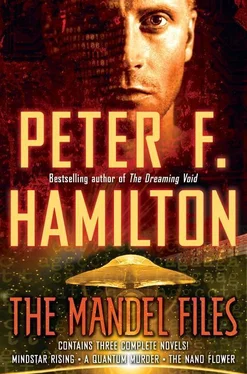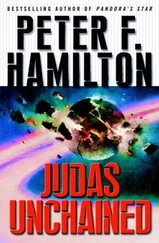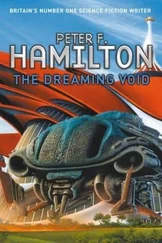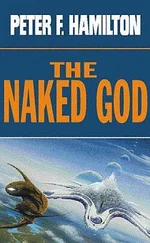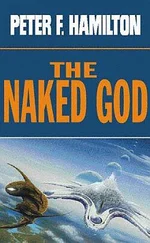“And Event Horizon holds the patent,” Philip chuckled savagely. “We’re going to wipe the floor with the opposition. A Custer and the Indians massacre. I’ll make damn sure of that when I introduce the stuff on the market.”
Greg took another look at the mass of fibre-optic cables leading out of the plinth, trying to work out the NN core’s bit rate. “You’re still running Event Horizon,” he said. All Philip Evans’s talk about arranging for trustees he had confidence in, and the flash of cunning at the time, came flooding back to him.
“Damn right I am, boy. There are no trustees, never were, the nominees are all Zurich fronts. Event Horizon is my life. No individual in the world can run a company better than me. I’m talking fifty years’ worth of accumulated experience. There’s no substitute for that. It’s the efficiency of dictatorship. A group of trustees would be worse than useless, lawyers and airhead accountants; they’d never push the giga-conductor with the kind of vigour necessary to effect a complete domination of the market. Discussion groups, reports, delays for consultation. What a load of crap. Event Horizon run by a committee would shrivel up and die an ignominious death. This is the perfect solution.
“Before now, when a family company grew too big for one person to pay attention to every detail it used to stall. It was inevitable. Responsibilities had to be delegated, the initial individual-led drive was diluted. But the NN core solves even that. I can devote myself one hundred per cent to each problem, no matter the size; co-ordinate every policy; supervise every division. No kombinate will be able to match a company run along these lines.”
“You were doing pretty well before,” Julia said acidly. “One ordinary person, and an ill one at that. With the right people in key posts Event Horizon will prosper. All that’s needed is direction, a firmness of purpose, the big decisions made quickly and implemented without delay.”
“And you can do that, Juliet, can you?”
“Yah.”
“Rubbish. You don’t have anything like the experience.”
She was angry now, straight-backed rigid, gripping the arms of her seat. “I do.”
“Node implants don’t give you experience, girl, just theory. All that money you spent getting rid of Kendric, pure bloody folly.”
Greg flicked a glance at Julia, intrigued. Her cheeks were burning red, embarrassed rather than angered. Implanted nodes had been banned in England by the PSP, for the usual heinous crime of elitism. The New Conservatives had yet to repeal the Act. But at least he could finally explain away her remarkably smooth thought currents, and that marvellous ability to fish obscure data out of memory cores.
“It’s like chess,” Philip Evans explained gently. “You know how each piece should move, but you don’t know the rules, the strategy. You’ll learn, Juliet, really you will. It just takes time. And I’m here to bridge the gap for you.”
“But the NN core is untried,” she said, fighting to keep her voice level. “How do we know all your memories translocated? Suppose these miraculous thought processes of yours are incorrect? And you’re basing judgements about the company’s entire future on them.”
Finally Greg understood her terror. She was afraid of losing everything; that wonderful edifice which was Event Horizon collapsing to rubble because it was balanced on a single assumption. And she had no way of checking the NN core’s integrity. No control.
“If I could bring us back to our current problem,” said Morgan Walshaw. “Unless something is done to solve it we may lose the core anyway.”
“You told me someone tried to kill you,” Greg said.
“Damn right, boy. Yesterday evening the NN core’s inputs were blitzed, saturated with override-priority data squirts. Every channel simultaneously; ground links and satellite circuits. It was clever, the attacker was attempting to force me out of the NN core with the sheer quantity of input. With all the data being given a priority code the core-function management program would have to assign it storage space, eventually displacing my memories. I would’ve been erased, for God’s sake! That’s attempted murder in my book.”
“So what went wrong?”
“I’m not a rational, neatly mathematical program. I fought back, began wiping their data as it came in, changed the priority codes, shut down the Event Horizon datanet-and you wouldn’t believe how much that’s going to cost us. They bloody nearly succeeded, though. If I’d been a Turing personality-responses program it would’ve been all over.”
Greg was fast getting out of his depth. He remembered questioning a legion cleric his squad had captured in Turkey, a fanatical fundamentalist, so devout he didn’t even acknowledge the infidel’s existence: his associative-word trick had been useless. The sense of displacement was familiar. He tried to sort out some sort of priority list in his mind.
“Have you safeguarded yourself from that attack method being employed again?”
“Yes. It’s a question of code encryption, I’ve altered my acceptance filters so that only half of my input circuits will accept priority squirts. Of course, there’s nothing to stop them from thinking up new methods.”
“So the problem is now centred around tracking down the source of the attack, right?”
“And eliminating it,” said Walshaw.
Greg opened his eyes. “Your department.”
Walshaw gave him a brief nod.
“So where did the data squirt originate from?” Greg asked.
Walshaw ran his hand through what was left of his hair. “We’ve no leads on that, I’m afraid. There were at least eight separate hotrods who hacked into the Event Horizon datanet, probably more, but with the shutdown we lost a lot of data. The blitz was well organized. All eight violators used multiple cut-outs to prevent us from tracing them.”
“I’m surprised they got in so easily.”
“Entry is no problem,” said Philip Evans. “it’s when you try to get our main account to transfer a million Eurofrancs to your Zurich bank or peek into research-team memory files that you run into trouble. Nobody has ever had a requirement to fend off this type of infiltration before. Its own crudity was what made it so successful.”
“Crude?”
“Well, relatively.”
“I’m trying to eliminate possibilities,” Greg said. “It wasn’t a blanket attack, was it? What I mean is, it was purposefully directed at you. They knew you were here?”
“Yes. I would say it’s got to be one of those bastard kombinates. They’ve discovered Ranasfari cracked the giga-conductor, and they’re badly worried. Anyone with a gram of sense can see the upheaval it’s going to cause. Trouble is, they can’t destroy it, there’s no turning the clock back. Instead they’ve settled for the next best thing, which is yours truly. Without me Event Horizon won’t be nearly as successful in marketing the stuff. They’d only have Julia and the non-existent trustees to deal with.”
“So that rules out joyburners,” Greg said. “They don’t work in packs, anyway. How well guarded is the knowledge of your continued existence?”
“Only twelve people in the world knew,” said Morgan Walshaw. “Thirteen counting yourself. That’s myself, Julia, Ranasfari, and the team which grew the NN core.”
“Just nine of them?” Greg asked incredulously.
“There’s nothing complicated about the process,” said Philip. “We’ve had neuro-coupling for eight years now, and the RNA splice is a standard procedure. It’s only the cost of this much bioware which prevents it from becoming widespread.”
“OK, next question. Would the hotrod team which launched the blitz have to be told you were here, or could they find out by analysing the data flow through Event Horizon’s network?”
Читать дальше
